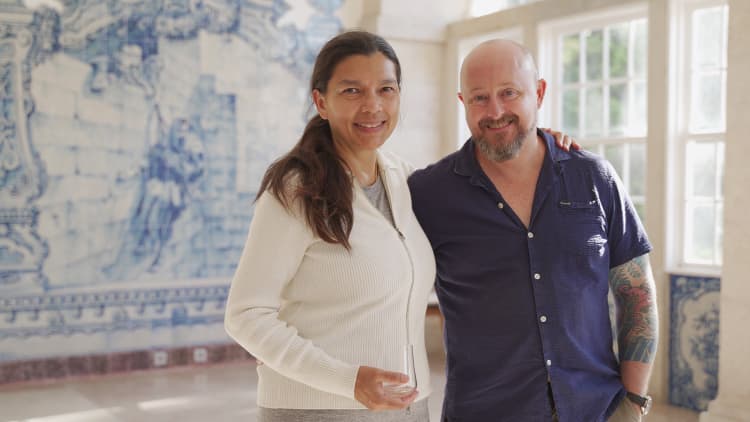[ad_1]
The first time I traveled to France, I was an undergrad. The trip opened my eyes to a refreshing perspective on life.
But it wasn’t until I moved to Paris from New York in 2011 that I noticed the driving force behind the way French people live. It’s called joie de vivre, and it means the “joy of living.” Parisians find joy in what they eat, where they go, conversations they have, and how they spend their time.
As a Nigerian raised in Austin, Texas, I always thought the best things in life were reserved for the ultra-wealthy. But anyone can access joie.
Here’s what French people do differently than Americans to cultivate joie de vivre:
1. They find pleasure in just being.
Without knowing it, my first visit to Paris — a single day of aimlessly wandering around on my own — allowed me to practice the fine French art of flânerie (“strolling”).
France’s work culture helps me find idle time. French workers get five weeks of paid vacation, in addition to 11 national holidays. In 2017, a law allowing employees to disconnect from off-hour work emails went into effect.
Make your own “right to disconnect” by turning off your devices when you’re not at work. Explore your city or sit in a park or a café and just be. Plan your break in advance so you have something to look forward to.
2. They build connections through food.
In France, where you buy your food matters as much as the food itself. I love asking the local cheesemonger for recommendations. He’ll help me choose from a variety of cheeses, letting me taste a few.
If we approach food shopping as a social activity, not only will we strengthen our sense of community and mental well-being, but we’ll also learn how to create healthy and delicious meals from the people we encounter.
I may visit multiple shops and markets in one day to buy food for my family.
Photograph copyright © 2023 by Jessica Antola.
Don’t let the need for efficiency deprive you of connection or the chance to learn about the food you eat. Visit a local farmers’ market and support your town’s specialty stores. Get to know your connoisseurs.
3. They bring people together.
The importance of gathering was instilled in me early on as a Nigerian. Still, I grew up eating in front of the TV more times than I care to remember.
But French people gather regularly and often spend dinner with family and friends around the table. Weekends meals are notoriously long. In 2010, UNESCO recognized the French meal as an “Intangible Cultural Heritage of Humanity.”
Invite the people you love into your home. Sit with them. Take in the sound of clinking glasses and plates. You’ll truly feel you are living the good life.
4. They celebrate and protect the arts.
France has an artist status known as intermittent du spectacle, which protects the likes of musicians, cinephiles, writers, painters, and others.
These professionals work a certain number of hours per year, and the government pays them a salary for the remainder of it, so they have time to create.
Parisians regularly gather with each other, and happy hours and meals stretch into the night.
Photograph copyright © 2023 by Jessica Antola.
Seeking beauty is also encouraged by other designations — “Most Charming Village,” “Most Remarkable Garden” — celebrating everything from architecture to green spaces.
So, if you want to find joy like French people, engaging in the arts is a good place to start. Research says that engaging in cultural activities (visiting a museum, attending a music concert, going to the theater) has profound effects on your health and happiness.
5. They feel good in their own skin.
I moved to Paris with green contact lenses and a $700 weave. Up until that point, I had lusted after the long, lean body of Naomi Campbell.
Fast-forward to living among French people, and I have shaved my head, replaced my designer dress obsession with a passion for antique plates, and changed my mind about going under the knife to modify my nose.
I am happily a work in progress. I’ve gradually adopted a new self-care attitude inspired by French culture, in which style, beauty, and overall mental well-being are derived from pleasure, preservation, and feeling bien dans ma peau (“good in your own skin”).
6. They don’t use the phrase ‘guilty pleasure.’
Plaisir (“pleasure”) is a word I hear or use every day.
French people follow an unspoken pleasure principle that we can all benefit from learning: If something doesn’t please them, they aren’t going to do it.
And if something does bring them pleasure, they sure as heck aren’t going to feel guilty for doing it.
You don’t need to compartmentalize your pleasure to certain times or moments. To adopt this French mindset, don’t be so extreme or hard on yourself. Embrace joy wherever you find it.
Ajiri Aki is the author of “Joie: A Parisian’s Guide to Celebrating the Good Life” and co-author of New York Times bestseller “Where’s Karl?: A Fashion-Forward Parody.” She has worked for the Metropolitan Museum of Art and the Museum of the City of New York. After moving to Paris, Ajiri started her lifestyle brand, Madame de la Maison. She lives in Paris with her husband and two children. Follow her on Instagram @ajiriaki.
Don’t miss:
Want to be smarter and more successful with your money, work & life? Sign up for our new newsletter here

Get CNBC’s free report, 11 Ways to Tell if We’re in a Recession, where Kelly Evans reviews the top indicators that a recession is coming or has already begun.
*This is an adapted excerpt from “Joie,” by Ajiri Aki, published by Clarkson Potter, an imprint of Random House. Copyright © 2023 by Ajiri Aki.
[ad_2]

